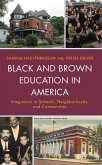The story of Brown v. Board of Education is a half-century old now and has been retold many times by historians, legal scholars, sociologists, and others. This collection of persuasive scholarly essays examines, for the first time, the role rhetorical theory played in the development of educational segregation. Contributors consider the NAACP's development of a series of graduate school cases to challenge Plessy, analyze the Brown decision itself, assess the state response to Brown, and critique the two Supreme Court decisions implementing the Brown decision. By illustrating how rhetorical strategies created, sustained, challenged, and, ultimately, reversed educational segregation in the United States, this work demonstrates the real value of the rhetorical perspective and provides encouragement to those who wish to help further develop this emerging field of judicial rhetoric.
Hinweis: Dieser Artikel kann nur an eine deutsche Lieferadresse ausgeliefert werden.
Hinweis: Dieser Artikel kann nur an eine deutsche Lieferadresse ausgeliefert werden.
The chapters complement each other and provide additional insight when read together. By illustrating how rhetorical strategies created, sustained, challenged, and, ultimately, reversed educational segregation in the United States, the collection demonstrates the real value of the rhetorical perspective. Sage Race Relations Abstracts, November 2007 Predating the filing of the litigation constituting the seminal and precedental lawsuits leading to Brown v. Board of Education were decades of restless and uncompromising agitation for change. This agitation emanated from platforms and pulpits; newspaper editorials and journals-on behalf of the rights of blacks. Targeted were the precepts of white superiority and black inferiority that the Supreme Court, through its decisions, had embedded in America's institutions. Brown v. Board of Education was the ultimate triumph that placed the rights of blacks before the law, on equal footing with whites. The 'Rhetorical Perspectives' provided by this powerful collection of essays describe the pathway that led to the transforming decision of Brown. -- Nathaniel R. Jones, Blank Rome LLP









